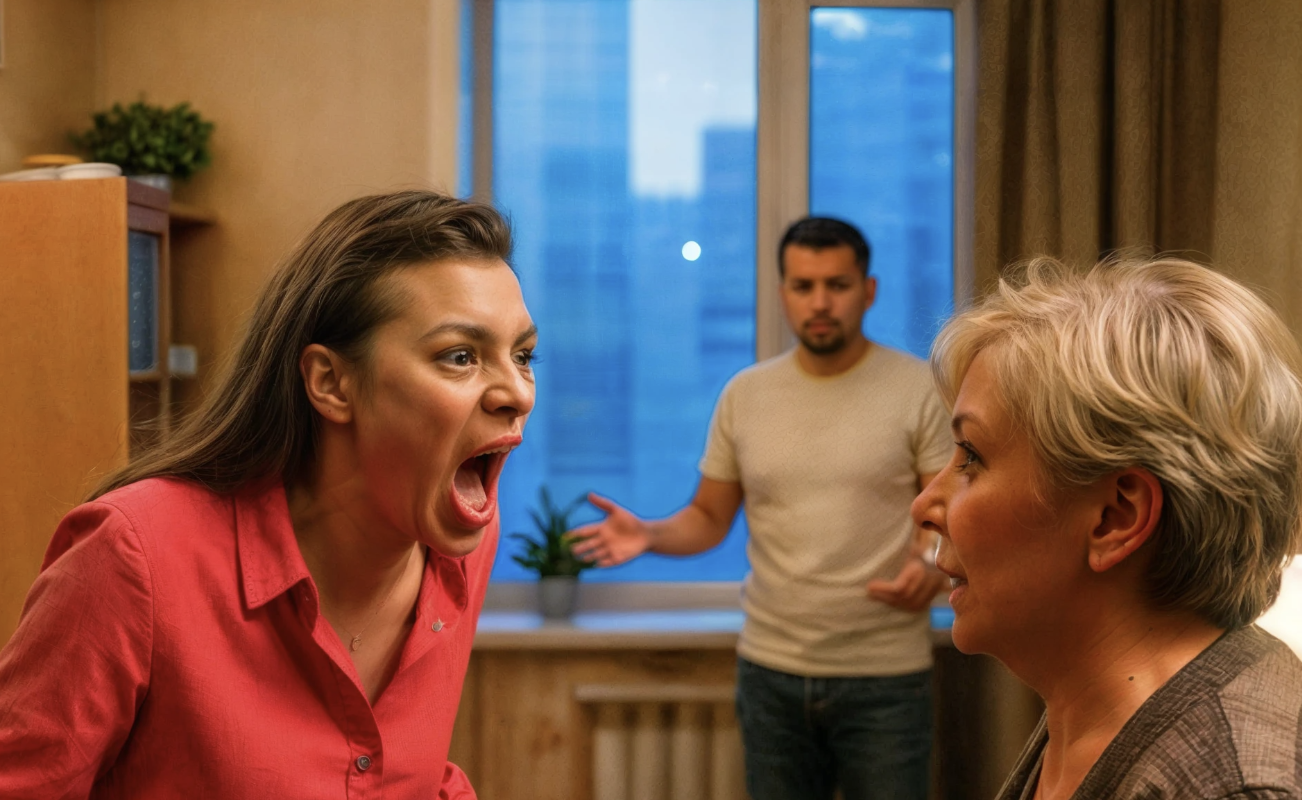When I opened the door and saw Valentina Petrovna on the threshold with two enormous bags, my heart sank. My mother-in-law stood there in her unchanging beige trench coat, hair pulled into a tight bun, lips pressed into a thin line. Her gaze slid over me with that all-too-familiar expression—a mix of disapproval and righteous indignation.
“Hello, Lena,” she said, stepping in without waiting to be invited. “I’ll only be here a short while.”
“Short while,” in her case, could mean anything—from a week to a month. I stepped aside, letting her into our tiny studio on Planernaya, where every square meter counted.
“Good evening, Valentina Petrovna,” I managed, feeling the tension clamp down on my shoulders. “We weren’t expecting you.”
“Do you really have to warn your own son before you come?” She dropped the bags right by the door and began unbuttoning her coat. “Where’s Sasha?”
“At work. He’ll be back in an hour.”
Valentina Petrovna surveyed our studio—twenty-eight square meters that somehow fit a bed, a narrow sofa, a table by the window, and a tiny kitchen nook separated by a breakfast bar. Her face took on that familiar look of condescending pity.
“Still living cramped like this,” she sighed, settling onto the sofa. “When will you finally buy a proper place? You’re young, you both work, and still you’re in this little cubbyhole.”
I bit my tongue. Yesterday, those words would have cut me to the quick, stirring up the usual wave of hurt and helplessness. But today—today was different.
“Let me make you some tea, Valentina Petrovna,” I offered neutrally. “You must be tired from the trip.”
While the kettle boiled, I texted Sasha: “Your mom’s here. No warning. With bags.” His reply was instant: “What?! I’m on my way.”
Over tea, my mother-in-law launched into a full monologue about how hard life was in their town, how everything kept getting more expensive, how difficult it was for Sasha’s sister Tamara to manage her son Dima. I half-listened, nodding in the right places, waiting for her to get to the real reason for her visit. Valentina Petrovna never did anything for nothing.
Sasha burst into the apartment forty minutes later, out of breath and hair tousled. He hugged his mother, kissed her cheek, but I could see the tension in his shoulders, the wary look in his eyes.
“Hi, Mom. Did something happen?”
Valentina Petrovna took a sip of tea, squared her shoulders, and looked at both of us with that special look that never boded well.
“Something did happen, Sashenka. Dima didn’t make it into a tuition-free spot. He didn’t score enough points. And a paid program—well, you know how much that costs. Where is Tamara supposed to get that kind of money? She’s on her own with him; his father, as you know, doesn’t help at all.”
Sasha slowly sank onto a chair.
“Mom, I’m very sorry, but—”
“Wait, I’m not finished,” she cut him off. “Plus he’ll need to rent a place. Dima wants Moscow—the communications institute. He’s a bright boy, capable, he just got unlucky with the exams. And at home he has no prospects at all. He’ll just stagnate there.”
I felt a coldness spread through my veins. No. Not this.
“Tamara asked me to talk to you,” my mother-in-law went on, now looking straight at me. “You’ve saved up for an apartment—you want a bigger place, closer to work, I know. Sasha told me at New Year’s.”
“Mom…”
“Listen to me!” Her voice sharpened. “You already have an apartment. Small, yes, but you have one. You manage to get to work somehow—and you always have. Nothing terrible. But Dima would get a chance at a normal life, an education! You two are young; you’ll earn more. But the boy needs help now, before it’s too late!”
Silence filled the room. I could hear only my own heartbeat and the traffic outside the window.
Sasha found his voice first.
“Mom, you can’t be seriously asking this.”
“I’m not demanding, I’m asking!” She threw up her hands. “Tamara is your own sister, Dima is your nephew! In a family we help each other! You and Lena have probably picked out a two-room place closer to the center to be more comfortable. But that’s indulgence, excess! And here a child needs an education, a future!”
All these years I’d held back, smiled, nodded when Valentina Petrovna told us how to live. I’d tolerated her comments that I cooked wrong, cleaned not thoroughly enough, dressed too brightly. I’d stayed silent when she said Sasha needed a more modest, more domestic wife. But this—this was too much.
“Valentina Petrovna,” I was surprised at how calm my voice sounded. “Let me clarify a few things.”
My mother-in-law turned to me, raising her eyebrows. There was surprise in her eyes—I usually chose to keep quiet.
“First, you came without an invitation and without warning. This is our home, small as it is. Second, you’re not asking—you’re demanding. There’s a difference, do you feel it? Third, you’re deciding for us how we should manage the money we earned ourselves.”
“Lena!” Valentina Petrovna began, but I raised a hand.
“I’m not finished. Sasha and I came to Moscow seven years ago. Each from our own hometown. We had no connections, no money, no residency permit. Nothing. I lived in a dorm, then in a room in a communal apartment at Rechnoy Vokzal, where the window looked out on factory smokestacks.”
I stood, paced the room, feeling the words push to get out.
“Sasha got into university on a tuition-free spot because he prepared hard and studied. I worked nights as a waitress just to get by. Neither of us asked anyone for help. We didn’t demand that someone else solve our problems.”
Valentina Petrovna opened her mouth, but I didn’t let her get a word in.
“Sasha finished his degree and got a trainee job for twenty thousand. After graduating, I landed a junior specialist position. We rented an apartment that swallowed half our combined salaries. We ate buckwheat and sausages. We wore second-hand clothes. We saved every ruble.”
I stopped in front of my mother-in-law and looked her straight in the eyes.
“Do you know how many years we saved for this apartment? Five. For five years we denied ourselves everything. No vacations. No cafés. Sasha’s sneakers fell apart—he glued the soles back on more than once because we were saving. For the apartment. For a normal life. For the children we want.”
“But Dima…”
“Dima is eighteen,” I said firmly. “He’s an adult. If he wants to study in Moscow—fine. Let him get a tuition-free place, like we did. Let him work and pay for school himself. Let him take out a loan. There are options. But it’s his life, his choice, his responsibility.”
“You’re heartless!” Valentina Petrovna flared. “His mother is alone, his father’s a drunk! How is he supposed to cope by himself?”
“The way we coped!” I felt my voice tremble, not from weakness but from righteous anger. “Valentina Petrovna, Sasha is your own son, but when he left for Moscow seven years ago, you gave him ten thousand rubles and said you couldn’t help more. Remember? He didn’t resent it. He understood you didn’t have the money. He carved out his own path. So did I.”
I sat opposite her, trying to rein in my emotions.
“We’re not turning our backs on family. But we are not obliged to sacrifice our life, our plans, our future for a nephew who didn’t even bother to prepare properly for the exams. You say he’s capable? Great. Let him prove it. Let him get in on a tuition-free spot next year. Let him find a job and pay for his education himself. That’s not cruelty. That’s life.”
Valentina Petrovna looked at me as if seeing me for the first time. Mixed emotions flickered in her eyes—shock, hurt, anger.
“Sasha,” she turned to her son. “Are you going to let her talk to me like that?”
I froze. This was the moment of truth. Everything depended on it now—not just the fate of our savings, but the future of our marriage.
Sasha was silent for a few seconds that felt like an eternity. Then he stood, came over, and put his hand on my shoulder.
“Mom, Lena is right. About everything.”
“What?”
“She’s right,” he repeated, more firmly. “We’re not to blame for Dima’s problems. We’re not obligated to solve them at the cost of our lives. You came here without even asking if it was convenient for us. You didn’t ask about our plans. You immediately started making demands and giving orders.”
“I’m your mother!”
“And I love you,” Sasha’s voice held a note of fatigue. “But Lena and I—we’re a family. We make decisions together. And our money really is our money. We earned it. We have the right to spend it as we see fit.”
He crouched beside his mother and took her hand.
“Mom, we’ve lived in this box for five years. Every morning I commute an hour and a half to work. Lena—an hour twenty. We come home late, exhausted, and we don’t even have a separate room to sit in quiet. We want kids, but how are we supposed to have them here?”
Valentina Petrovna turned away, wiping her eyes.
“People had kids in communal flats before and it was fine. No one complained.”
“Before, there wasn’t a choice,” Sasha said gently. “We have one. We can live better. We’ve earned that right. And you know what, Mom? I want my child to grow up in a normal apartment. To have their own room. I want Lena and me not to spend two hours commuting each way, but to be able to spend that time with our family.”
He stood, rubbing his face wearily.
“I’ll help Dima if he truly wants to study. I’ll find information on grants, scholarships, support programs. I can help with a résumé, suggest where to look for a job. But the apartment money—that’s sacred for Lena and me. I’m sorry.”
Valentina Petrovna sat in silence for a minute, two, three. Then she stood abruptly.
“Fine. I understand. Everyone looks out for their own.”
“Mom…”
“Don’t, Sasha. I can see I’m not welcome here. I’ll go to a hotel.”
“Valentina Petrovna,” I stood too. “We’re not throwing you out. Stay the night. Just please understand our position.”
She looked at me for a long moment.
“So you do have a backbone, Lena. You played the quiet one, but inside—you’re steel. Maybe you chose well, Sasha, I don’t know.”
She started gathering her things. Sasha tried to stop her, but she brushed him off.
“I’ll take the morning train. I’ll spend the night at my friend Vera Nikolaevna’s. She lives near Shchyolkovskaya.”
We didn’t try to hold her back. When the door closed behind her, I collapsed onto the sofa, my hands shaking.
“Did I go too far?” I whispered.
Sasha hugged me, pulling me close.
“No. You were right. About everything. And thank you for not being afraid to say it.”
“What if she never speaks to us again?”
“She will,” he said with a tired smile. “My mom gets offended easily, but she lets things go. It’s just the first time in her life someone told her ‘no’ that firmly.”
That night I couldn’t sleep, replaying the conversation in my head. Did I do the right thing? Was I too harsh? But every time doubt began to creep in, I remembered our five years in this box. I remembered Sasha gluing his sneakers back together. I remembered stretching buckwheat for a week. I remembered us sitting with a calculator, counting how much more we needed to save. I remembered how we dreamed of a spacious kitchen where we could cook together, of a balcony where I could grow flowers, of a separate bedroom with a big bed.
No. I was right. We earned this. We deserve this.
In the morning, Valentina Petrovna called. Her voice was cold, formal.
“I’m leaving. I’ll think about what you said. Maybe you’re right about some things. But it hurt to hear.”
“It hurt to say it, too,” I admitted. “But sometimes the truth cuts.”
“I’ll pass along the scholarships and grants to Dima,” she added more softly. “Let him try on his own. Maybe it’ll work out.”
When we hung up, I felt a weight lift from my shoulders. Not all of it, of course—but a significant part.
Three months later we signed the contract for a two-room apartment closer to the center. Fifty-eight square meters, two windows facing south, a twelve-meter kitchen, a balcony. Now Sasha’s commute is forty minutes, mine—thirty-five.
Valentina Petrovna came to the housewarming. She brought embroidered doilies and, shyly, asked for forgiveness.
“I was wrong,” she admitted at the table. “It wasn’t my place to decide for you. And Dima, by the way, found a job. He’s going to try for a tuition-free spot next year. Says he can handle it himself. Turns out he can do things when he wants to.”
I hugged her, feeling the last ice between us melt.
“And we,” Sasha raised his glass, “are going to be parents soon.”
Valentina Petrovna burst into tears—this time from happiness.
Now, looking at our spacious apartment where a crib already stands in the nursery for the daughter who will be born in three months, I understand that on that difficult evening I did the most important thing. I protected our family. Our dreams. Our right to happiness—the one we earned through our own work.
And you know what matters most? Valentina Petrovna now asks when she can visit. And we’re happy to invite her. Because respect has finally become mutual.
Sometimes love requires firmness. Sometimes protecting your family starts with a simple, yet very hard word—“no.” And sometimes the greatest gift we can give our loved ones is teaching them to respect our interests and our choices.
We did it. Together.



